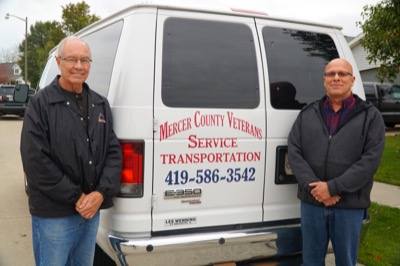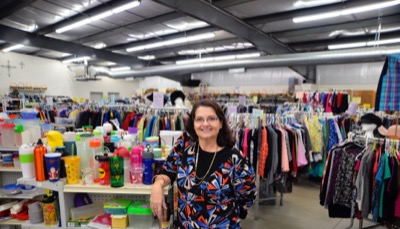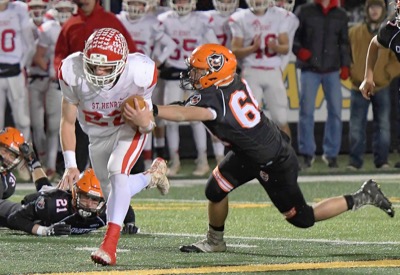Saturday, November 10th, 2018
Drivers enjoy camaraderie with fellow veterans
By Sydney Albert

Photo by Sydney Albert/The Daily Standard
Mark Fleck, left, and Steve Feltz stand by one of the Mercer County Veterans Service's transportation vans. Veterans who use the service to get to Department of Veterans' Affairs appointments often enjoy the camaraderie of going in a group, they said.
CELINA - Taking fellow veterans to medical appointments with the Department of Veterans' Affairs is fulfilling work, and both drivers and passengers can enjoy a sense of camaraderie, according to two drivers with the Mercer County Veterans Service Commission.
Mark Fleck of Celina and Steve Feltz of Coldwater are both Army veterans. Feltz has been part of the Veterans Service's transportation program for nearly a year, having joined not long after his recent retirement. Fleck joined in late 2014. A friend of his was already a driver in the program and mentioned a position had opened up. Fleck thought it would be a good way to spend his free time. After four years, Fleck said he's still having fun and finds the work gratifying.
"We know we're doing a good deed because we're getting the veterans to (their appointments) because they have to go to the hospital for their illnesses and stuff, and it just feels good to help get them there," Fleck said.
The MCVSC has been providing transportation for veterans for about 30 years, even before it was required by law, according to administrative assistant Barb Risch. Now, the state requires every Veterans Service office to provide transportation to VA appointments. Depending upon where veterans live, veterans may be provided with a bus token, a taxi or the service of volunteer or employee drivers such as Fleck and Feltz, Risch said.
Not only do the veterans appreciate the service but drivers also end up getting to know them pretty well.
"You have your regulars. The best time is when you get one-on-one with them. If you get one-on-one with them, a lot of times they'll tell you their story, and they've all got a story to tell," Feltz said. "It don't get no better than that. It's just two brothers in arms, is what it amounts to."
"And you understand what they're talking about, and how they felt at the time," Fleck interjected.
"And how they feel about it now," Feltz added.
Risch said many times, veterans don't share their stories with family members, but the office and the vans are considered neutral ground. They may open up about things, both good and bad, that even their family members don't know.
With veterans of all ages, genders and personalities, the stories can run the gamut. When you get to know some of them so intimately, it's easy to grow attached, he added.
Their conditions can run the gamut, too. Some veterans may be in the beginning stages of dementia, while others have severe hearing loss or traumatic brain injuries. Vietnam veterans may be dealing with the aftereffects of exposure to Agent Orange, which has been linked to the formation of several cancers and other diseases. Post-traumatic stress disorder is also common.
"From what they went through, I'm amazed that some can get over it, but then, it's nice for them to talk about it. They have a relief outlet that takes a little stress away," Fleck said.
Most riders Fleck takes are happy with the care they receive from the Dayton VA and feel they're getting what they need. If people arrive in a group, Fleck felt the VA tends to get to them faster, and he said improvements were being made under a new director.
Rather than sitting in the cafeteria or waiting in the van, the drivers also walk around to visit the passengers and keep tabs on them as they wait for their appointments or go through the process. Even that simple gesture can make veterans feel better, Fleck said.
MCVSC drivers are usually required to be veterans, but if veterans aren't available, veterans' spouses or children could also be eligible. The program has three usual drivers and two back-ups who can take veterans to clinics in Lima, the Dayton VA Medical Center or wherever their appointments are.
The drivers are technically part-time workers, but some days it can seem more like full-time work. They may start picking people up as early as 5:30 a.m. and, depending on how appointments go, could still be at the hospital at 3 p.m. Each driver works about two or three days a week to allow for time off. Risch creates a list of names with information for the drivers, who then coordinate pickup times. Fleck said about 165 veterans live in Mercer County, and agency personnel are available to help them all, from Wabash to Rockford to Maria Stein.


